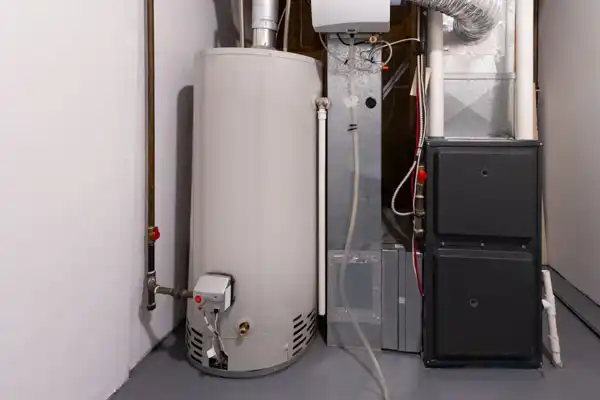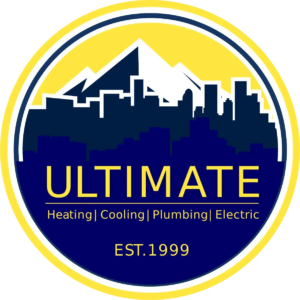Are you considering replacing your old water heater or installing a new one in your Colorado home? With various options available in the market, selecting the perfect water heater can be a daunting task. At Ultimate, we aim to make this decision easier for you by providing valuable information about the different types of water heaters.
In this comprehensive guide, we’ll discuss tank water heaters, tankless water heaters, heat pump water heaters, solar water heaters, and condensing water heaters.
By understanding the pros and cons of each type, you can make an informed decision and choose the right water heater for your home, then find the right plumbing services to help you install one.
1. Tank Water Heater
A tank water heater is a traditional water heater that stores and heats water in an insulated storage tank, available in sizes ranging from 40 to 75 gallons. It is equipped with temperature and pressure control valves to maintain safe levels.
Tank water heaters need to be cleaned twice a year to increase longevity and prevent sediment build-up in your pipes. They can be powered by gas or electricity and typically last 10-15 years. The low installation costs make tank water heaters a popular choice among the homeowners we work with.
Advantages of Tank Water Heaters
• Affordable installation
• Easy to replace
• Wide range of tank sizes
• Can work with either gas or electric power sources
Disadvantages of Tank Water Heaters
• Limited hot water supply
• Takes up space
• Less energy-efficient compared to other options
• Requires regular maintenance
2. Tankless Water Heater (On-Demand Hot Water Heater)
Tankless water heaters, also known as on-demand hot water heaters, heat water instantly as it flows through super-heated coils. These units work well with Denver area homes that have natural gas connections, although electric tankless water heaters are also available. They require annual maintenance and have a 20-year lifespan.
Tankless water heaters may have a higher initial cost than tank models, but they are 24-34% more efficient, according to the U.S. Department of Energy. It is essential to choose the right size for your home to ensure adequate hot water supply, especially during Colorado’s colder months.
Advantages of Tankless Water Heaters
• Energy-efficient
• Unlimited hot water supply
• Longer lifespan
• Compact and space-saving
Disadvantages of Tankless Water Heaters
• Higher initial cost
• May require upgrading gas lines or electric capacity
• Requires regular maintenance
• May need multiple units for larger homes
3. Heat Pump Water Heater
Heat pump water heaters are energy-efficient units that use heat from the air or ground to heat water. They can be connected to an electric backup source, making them a “hybrid” option. These water heaters use up to 60% less electricity and need to be cleaned twice a year. However, they may not work well in colder areas and require an 8ft clearance for the heat pump installation.
Although they have a higher initial cost, the energy savings make them an attractive option for environmentally-conscious homeowners
Advantages of Heat Pump Water Heaters
• Highly energy-efficient
• Uses renewable energy sources
• Can work as a hybrid with an electric backup
• Lower operating costs over time
Disadvantages of Heat Pump Water Heaters
• Higher initial cost
• May not work well in cold climates
• Requires additional space for installation
• Requires regular maintenance
4. Solar Water Heater
Solar water heaters are the most energy-efficient option, particularly suitable for sunny Denver days. They harness the sun’s energy to heat water and typically require a backup source for cloudy days or nighttime use. The installation cost can be expensive, but tax rebates may offset this expense. Solar water heaters are an excellent choice for Denver area homeowners looking to reduce their carbon footprint and save on energy bills.
Advantages of Solar Water Heaters
• Extremely energy-efficient
• Utilizes renewable energy
• Can significantly reduce energy bills
• Potential tax rebates and incentives
Disadvantages of Solar Water Heaters
• Expensive initial investment
• Requires backup system for cloudy days or nighttime
• Installation may be complex
• Maintenance and repairs can be costly
5. Condensing Water Heater
Condensing water heaters are suitable for homes with natural gas connections and require a minimum 55-gallon tank. They heat water using the home’s gas fumes, making them a more efficient choice. Condensing water heaters can be tank or tankless and have a 10-15 year lifespan. The installation process may involve reconfiguring gas lines and vents, leading to higher initial costs.
Advantages of Condensing Water Heaters
• Energy-efficient
• Can be tank or tankless
• Utilizes waste heat from gas combustion
• Suitable for homes with natural gas connections
Disadvantages of Condensing Water Heaters
• Higher initial cost
• May require reconfiguration of gas lines and vents
• Limited to homes with natural gas connections
• 10-15 year lifespan
When it comes to selecting the perfect water heater for your Colorado home, it is crucial to weigh the pros and cons of each option. Consider factors like energy efficiency, installation costs, and maintenance requirements to make an informed decision. At Ultimate, we have experts in plumbing services, and our knowledgeable technicians can guide you through the process of choosing and installing the right water heater for your home, keeping in mind the climate and infrastructure available in your area.
Ready to upgrade your water heater or need professional advice? Contact Ultimate today for top-notch plumbing services in the Denver metro area. Our experienced technicians are ready to help you find the perfect water heater solution tailored to your specific needs. Call us now at [theme_company_telephone] or contact us to schedule a consultation. Don’t miss out on our latest offers and promotions for HVAC, plumbing, and electric services. Experience the Ultimate difference and enjoy a more comfortable, energy-efficient home today!


